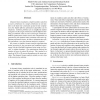Free Online Productivity Tools
i2Speak
i2Symbol
i2OCR
iTex2Img
iWeb2Print
iWeb2Shot
i2Type
iPdf2Split
iPdf2Merge
i2Bopomofo
i2Arabic
i2Style
i2Image
i2PDF
iLatex2Rtf
Sci2ools
126
click to vote
WCRE
2002
IEEE
2002
IEEE
Register Liveness Analysis for Optimizing Dynamic Binary Translation
Dynamic binary translators compile machine code from a source architecture to a target architecture at run time. Due to the hard time constraints of just-in-time compilation only highly efficient optimization algorithms can be employed. Common problems are an insufficient number of registers on the target architecture and the different handling of condition codes in source and target architecture. Without optimizations useless stores and computations are generated by the dynamic binary translator and cause significant performance losses. In order to eliminate these useless operations, a very fast liveness analysis is required. We present a dynamic liveness analysis algorithm that trades precision for fast execution and conducted experiments with the SpecInt95 benchmark suite using our PowerPC to Alpha translator. The optimizations reduced the number of stores by about 50 percent. This resulted in a speed-up of 10 to 30 percent depending on the target machine. The dynamic liveness a...
Dynamic Binary Translator | Dynamic Liveness Analysis | Software Engineering | Target Architecture | WCRE 2002 |
Related Content
| Added | 16 Jul 2010 |
| Updated | 16 Jul 2010 |
| Type | Conference |
| Year | 2002 |
| Where | WCRE |
| Authors | Mark Probst, Andreas Krall, Bernhard Scholz |
Comments (0)

